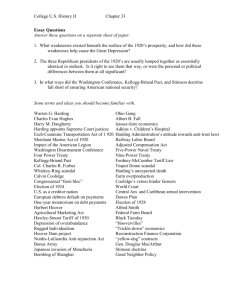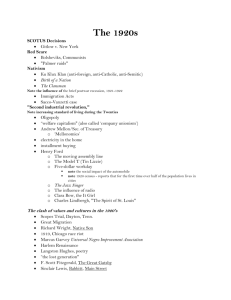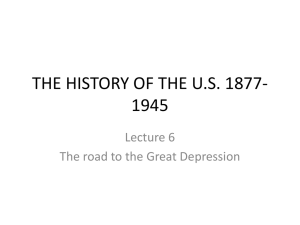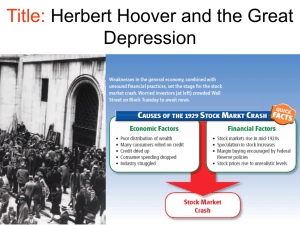Chapter_20_The_Twenties
advertisement
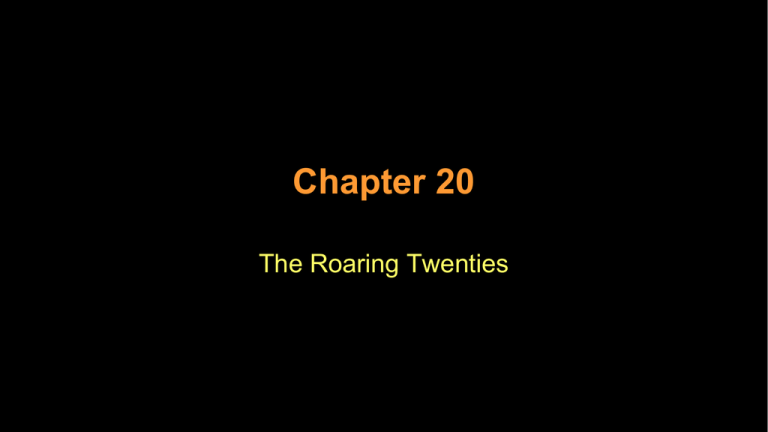
Chapter 20 The Roaring Twenties Normalcy • Harding Genial Lack of strong convictions Put strong men in important offices Gave lesser offices to the “Ohio Gang” Harding Scandals • Charles Forbes – embezzled millions appropriated for veterans’ hospitals • Attorney general Daugherty implicated in fraud • Teapot Dome Scandal Secretary of Interior Albert Fall Leased government oil reserves to private oil companies Coolidge • Calvin Coolidge Elected after three-party split election (LaFollette ran on Progressive ticket) After elected cleaned house Kept on Secretary of Treasury Mellon “Silent Cal” Peace • Both Harding and Coolidge deferred to the Senate on foreign affairs • US overwhelmingly isolationist • Economic interests forced US to seek American influence abroad • Continued Open Door Policy in China – required increasing checks on Japanese expansionism Peace • The Washington Conference Five-Power Treaty o US-GB-Fr-Jp-It agreed to stop building battleships and reduce fleets to a fixed ratio Four-Power Treaty o US-GB-Fr-Jp agreed to respect each other’s interests in Pacific and confer if any attack launched Nine-Power Treaty o All powers agreed to respect Chinese independence and maintain Open Door Peace • Treaties signified US interest in world affairs but treaties toothless • Ratio under treaty actually gave Japanese naval dominance in Pacific • Treaty made Philippines indefensible and endangered Hawaii • Japan offended by National Origins Act 1924 that omitted Japan from quota • Both Japanese and American military officers considered war between US and Japan inevitable Peace • Peace organizations flourished in 1920’s • Isolationism strengthened • Kellogg-Briand Pact 1928 French foreign minister Aristide Briand and US Secretary of State Frank Kellogg Treaty meaningless - pushed by peace movement Diplomats from 15 countries signed treaty renouncing war as implement of policy Good Neighbor Policy • Hoover first to treat Latin Americans as equals • Re-interpreted Roosevelt Corollary to Monroe Doctrine to mean US to intervene only in self-defense • Marines in Haiti, Nicaragua, and Dominican Republic recalled in 1934 • Platt amendment abrogated • Latin Americans still resentful of “rich Americans” Totalitarian Challenge • 1931 Japanese occupied Manchuria made into puppet state Manchukuo • Violation of Kellogg-Briand Pact and Nine-Powers Treaty • US and League of Nations asked by Chiang Kai-shek to intervene – US refused – not a world policeman • 1932 Japan attacked Shanghai • Condemnation by League of Nations resulted in Japanese withdrawal from League War Debt & Reparations • US lent Allies $10 billion for WWI – wanted money repaid • Allies demanded billions from Germany to pay for war • 1924 Dawes Plan scaled down German reparations • 1929 Young Plan further scaled down German reparations • When Great Depression struck both Germans and Allies defaulted on payments The Long Bull Market • The Election of 1928 Hoover versus Al Smith Issues - Catholicism • The Stock Market Bull Market – long period of rising stock prices Speculation – buying stocks in the hope of selling them quickly for a profit Margin – buying stocks on small cash down payment. Rest of cost was interest-bearing loan Margin Call – demanding immediate repayment of loan The Great Crash • Stock prices hit peak and started to fall • Investors sold more and more stock causing prices to fall further • Margin calls caused people to sell stocks at even lower prices – drove market into tailspin • October 1929 Black Thursday – market plummeted/many investors financially wiped out • Crash did not cause Great Depression but weakened US financial stability The Great Crash • Banks Market crash weakened banks Banks had made loans to stock speculators and invested depositors’ money in stocks To cover losses, banks drastically reduced loans – businesses and people unable to borrow money Some banks forced to close – depositors lost all savings Bank Run - depositors went to banks and withdrew all money Withdrawals exceeded cash reserves causing more banks to fail By 1932, 1 in 4 banks closed Roots of the Great Depression • Factors Causing Great Depression Wealth Gap – fewer people could buy products Overproduction – Factories/farms produced more but low wages meant people bought less Agriculture – farmers bought land & equipment during WWI’s high demand. End of war brought low prices wiping out many Installment Plans (credit) – high cost items bought on credit. People stopped purchasing to pay off debt causing factories to cut production & lay off workers Downturn caused ripple effect in economy Roots of the Great Depression No unemployment insurance or other safety nets Stock speculation cut loans to foreign nations – foreigners could not buy American products Hawley-Smoot Tariff – raised tariffs to historical high Foreign nations retaliated w/high rates – fewer US products purchased Federal Reserve – kept interest rates low encouraging risky loans. Businesses expanded when sales were falling. Reserve then raised interest rates which tightened credit The Depression Worsens • Bank closures and business bankruptcies continued into 1932 • People lost homes or were evicted from rentals – many built temporary houses out of trash on public lands (shantytowns). People called them Hoovervilles after President Hoover • Hobos - homeless men and boys wandered across country looking for work or place to stay – many by railroad • Repatriation – some immigrants went back to home countries, some forced such as Mexicans. Many were actual American citizens The Dust Bowl • Large-scale agriculture on Great Plains caused erosion of topsoil • High winds and drought caused extreme dust storms • During 1930’s, about 50 dust storms hit prairie per year • Crops were buried, livestock and sometimes humans died due to dust-clogged lungs • Migration from affected areas mostly to California (“Okies”) Hoover’s Response • Hoover believed that American “rugged individualism” would keep US economy moving • Tried to get businesses to maintain employment/wages but most failed • Funded public work projects – not enough jobs generated • Refused to spend money on direct relief – finally relented and signed Emergency Relief and Construction Act • Asked Federal Reserve to print more money – Fed refused • Set up Reconstruction Finance Corporation (RFC) to loan money to businesses – did not loan enough Angry Mood • People growing desperate • Increased instances of looting of grocery stores • Hunger marches sponsored by Communist Party • Communist Party saw biggest increase in membership during Great Depression • ~One million farms foreclosed • Farmers destroyed crops to raise prices Bonus March • WWI veterans promised $1,000 bonus payable in 1945 • Desperation caused large group (~15,000) to march on Washington DC and demand payment now • Marchers squatted in Hoovervilles in city – occupied government offices • Congress refused to pay bonus – Hoover ordered army to remove marchers from government buildings • General Douglas MacArthur cleared buildings and attacked/burned camps – two veterans killed • Hoover blamed for fiasco Closing the Gates to New Immigrants • World War I caused immigration to dramatically increase • Congress passed a quota system that closed the gates to Southern Europeans and Jews • The National Origins Act caused foreign-born percentage of population to fall • Jews subjected to increasing antiSemitism New Urban Social Patterns • By 1920, more Americans lived in urban areas rather than rural ones • Urban environment changed family patterns- marriage a partnership where women were equal • Emergence of child expertsranged from rigid training to permissiveness • Urbanization loosened constraints on sexuality The Younger Generation • Disillusionment over the Great War and prudery of elders caused more liberal expression • Advent of dating versus courting • Relations between the sexes becoming more relaxed / uninhibited • Fashion and public behavior impacted • The Flapper – dressed and behaved in a bold, unconventional manner The New Woman • After 1920 – more openness about sex but contraception concern of married women • Margaret Sanger – Bohemian – leader of birth control movement • Birth control not constitutionally protected until 1960s • The passage of the 19th Amendment caused rift in women’s movement as some saw more work needed while others saw the job as done Popular Culture: Movies and Radio • The film industry became the 4th largest in capital investment • Films became new art: lighting, camera angles, new methods of narrative • New celebrities – American royalty? • Impact of radio on common population Immediate communication Advertising • 1934- FCC established to revoke licenses that failed to operate in the public interest The Golden Age of Sports • People had more money to spend and more time to fill • Sports superstars and the rise of professional sports • Rise of school team sports Jim Thorp Babe Ruth Urban-Rural Conflicts • Changes mostly in urban areas • Changes resented by rural areas – seen as sinful, overly materialistic, and unhealthy • Radio and movies caused rural areas to want new ways at same time they spoke out against new ways • Manifested in resurgence of religious fundamentalism conservatism Urban-Rural Conflicts • Conflict illustrated by Scopes “Monkey” Trial Darwin’s theories banned William Jennings Bryan versus Clarence Darrow Biology teacher – John Scopes – taught evolution Test case for ACLU Conviction Prohibition • Rural versus urban conflict – alcohol • 18th Amendment – Prohibition • Alcohol related crimes dropped • Total abstinence caused many to violate law Smuggling Bootleggers Speakeasies Bathtub gin Alcohol “prescriptions” Hypocrisy of officials Gangsterism The Ku Klux Klan • Revival in 1920’s – symptom of social malaise (apathy) • Targeted Blacks, Catholics, and Jews • Very little appeal in NE and cities – most popular in mid-west and west • Success caused factionalism and squabbling over power and money • Conviction of leader, David Stephenson, for rape and death of young woman caused dramatic decline Sacco and Vanzetti • Crime: 1921 robbery and murder of shoe factory paymaster and guard • Accused: Nicola Sacco and Bartolomeo Vanzetti – Italian immigrants and anarchists • Convicted & sentenced to death • Cause celebre • Executed 1927 – disillusioned intellectuals The New Negro • Disappointment after WWI gains Segregation Labor issues • Marcus Garvey Separatism Back to Africa • The Ghetto Concentrated political power Built self-confidence & brought opportunity • Culture Jazz – Louis Armstrong Harlem Renaissance Marcus Garvey Economic Expansion • Little government interference • Federal Reserve kept interest rates low • Post-war demand for products • Increased mechanization • Increased use of electricity • Assembly line • “Taylorism” Age of the Consumer • Rise of advertising • The installment plan • The Automobile Biggest single impact on American society in 1920’s Million+ cars produced per year – cars cheaper New industries to supply parts for cars New road building Changes in family life and recreational patterns Sense of freedom The Airplane • Internal combustion engine made airplane possible • Wright Brothers • Most planes built before 1920 intended for military use • Charles Lindbergh – solo flight across Atlantic • Glenn Curtiss – father of naval aviation
